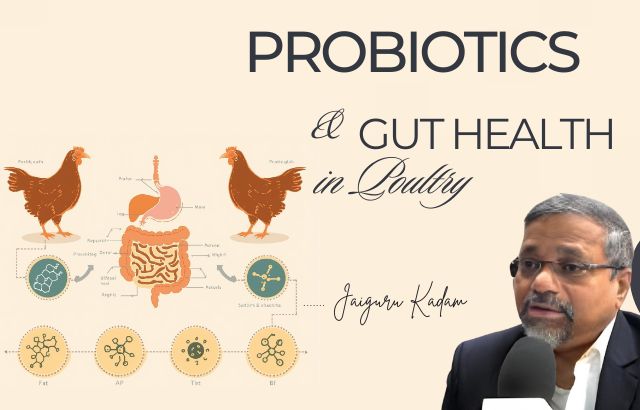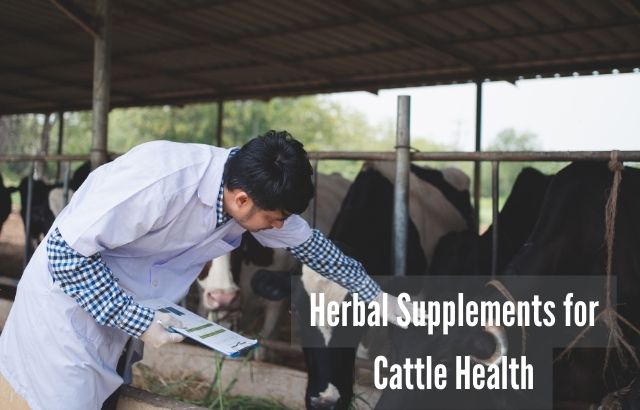In recent years, the spotlight has shifted to gut health as a critical factor in both animal welfare and agricultural sustainability. In poultry farming, maintaining a balanced and healthy gut microbiome is key to ensuring optimal growth, disease resistance, and overall health of the birds. A major green innovation that’s playing a significant role in improving poultry gut health is the use of probiotics—live microorganisms that positively impact the host’s health when consumed in adequate amounts.
Jaiguru Kadam, an expert in agricultural innovation, highlights the profound potential of probiotics in transforming the way poultry is raised, particularly when it comes to the management of gut flora and combating harmful pathogens. In this blog post, we’ll dive deep into the role probiotics play in poultry gut health, focusing on how specific probiotic strains like Lactobacillus acidophilus and Bacillus subtilis can help improve digestion, enhance immunity, and fight off harmful bacteria such as Salmonella and E. coli.
The Gut Microbiome: The Foundation of Poultry Health
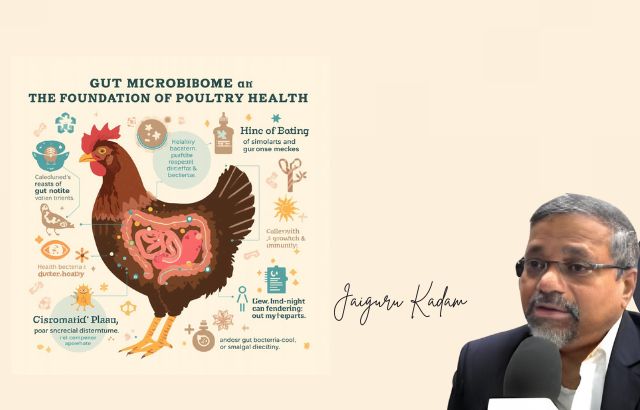
The gut microbiome in poultry consists of a complex community of microorganisms, including bacteria, fungi, and viruses, which play a crucial role in digestion, immunity, and overall health. A balanced gut microbiome ensures that poultry can efficiently digest feed, absorb nutrients, and defend against harmful pathogens.
However, modern poultry farming often disrupts the natural balance of gut flora due to factors such as stress, poor diet, or the use of antibiotics. This imbalance can lead to reduced digestion efficiency, increased susceptibility to infections, and even disease outbreaks, resulting in significant economic losses.
Here’s where probiotics step in. When added to poultry feed, probiotics help restore and maintain a healthy gut flora, improving digestion, enhancing immune function, and preventing the colonization of harmful bacteria.
How Probiotics Improve Gut Flora and Combat Pathogens
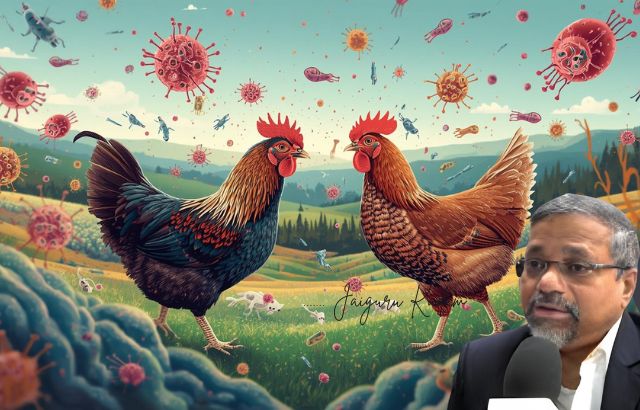
Probiotics are live microorganisms that exert beneficial effects by directly influencing the gut microbiome. Among the most common and effective probiotic strains used in poultry farming are Lactobacillus acidophilus and Bacillus subtilis. These strains are well-researched for their ability to improve digestion, enhance nutrient absorption, and control pathogenic bacteria.
Lactobacillus acidophilus
Lactobacillus acidophilus is one of the most widely used probiotics in poultry farming due to its ability to:
- Inhibit Pathogenic Bacteria: It produces lactic acid, which lowers the pH of the gut environment, creating an inhospitable environment for harmful bacteria like Salmonella and E. coli. By maintaining an acidic gut, Lactobacillus acidophilus helps prevent the growth of these pathogens.
- Enhance Nutrient Absorption: This probiotic strain improves digestion by breaking down food more efficiently, allowing poultry to absorb more nutrients from their feed. This results in improved weight gain and better overall health.
- Boost Immune Function: Lactobacillus acidophilus promotes the growth of beneficial bacteria in the gut that stimulate the poultry’s immune system, enhancing their ability to fight off infections.
Bacillus subtilis
Bacillus subtilis, another highly effective probiotic, offers distinct advantages for gut health:
- Competitive Exclusion of Pathogens: Bacillus subtilis competes with harmful pathogens for space and nutrients in the gut, making it harder for pathogens like Salmonella and E. coli to colonize the gut lining.
- Production of Antimicrobial Compounds: This probiotic strain produces natural antimicrobial substances that directly inhibit the growth of harmful bacteria, providing a double layer of protection against pathogens.
- Enhanced Digestive Efficiency: Bacillus subtilis improves the breakdown of complex carbohydrates, protein, and fats, ensuring that poultry get the maximum benefit from their feed.
The Impact of Probiotics: 20-30% Reduction in Pathogenic Bacteria
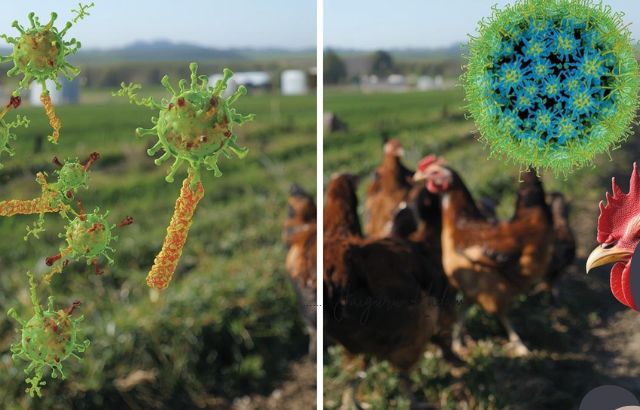
The use of probiotics in poultry feed has been shown to result in significant reductions in harmful bacteria. In fact, studies indicate that the introduction of probiotics like Lactobacillus acidophilus and Bacillus subtilis can lead to a 20-30% reduction in pathogenic bacteria in the gut. This reduction is crucial for improving overall poultry health and minimizing the need for antibiotics, which has broader implications for both animal welfare and environmental sustainability.
For example, research conducted by the University of California, Davis found that broiler chickens supplemented with probiotics showed a 25% reduction in Salmonella colonization compared to those fed a standard diet. Similarly, a study in Brazil reported that poultry supplemented with Bacillus subtilis had significantly lower levels of E. coli in their gut, demonstrating the potential of probiotics to protect against foodborne pathogens.
Jaiguru Kadam’s Insights: Boosting Gut Microbial Diversity for Optimal Health

Jaiguru Kadam, an advocate for sustainable agricultural practices, emphasizes the importance of diversity in the gut microbiome. He advises that a healthy poultry gut should contain a wide range of microbial species to ensure optimal digestion and disease resistance. According to Kadam, the use of multiple probiotic strains, including Lactobacillus acidophilus and Bacillus subtilis, is crucial for improving microbial diversity and maintaining a healthy gut environment.
Kadam’s advice is grounded in the understanding that a diverse microbiome enhances the gut’s ability to:
- Adapt to Dietary Changes: A varied microbial community can better adapt to changes in diet, ensuring consistent feed conversion efficiency and growth.
- Resist Pathogen Overgrowth: A balanced microbiome can prevent the overgrowth of harmful pathogens, reducing the risk of infections and diseases.
- Support Long-Term Health: Maintaining gut microbial diversity supports long-term animal health, reducing the need for antibiotics and contributing to the sustainability of poultry farming.
Practical Examples: Success Stories in Probiotic Poultry Farming
- Cargill’s Probiotic Poultry Feed: Cargill, a global leader in animal nutrition, has incorporated probiotics into their poultry feed products. According to their research, broilers fed probiotic-enriched feed experienced a 20-25% reduction in Salmonella and E. coli levels, as well as a 10% improvement in feed conversion efficiency. These results not only improve the health and growth of the chickens but also help reduce the environmental impact of poultry farming by lowering antibiotic use and waste production.
- AB Vista’s Multi-Strain Probiotic Formula: AB Vista, a leading animal nutrition company, has developed a multi-strain probiotic formula that combines Lactobacillus acidophilus, Bacillus subtilis, and other beneficial microbes. Their formula has been shown to reduce pathogenic bacteria by up to 30% in poultry and significantly improve overall gut health. The company reports healthier, faster-growing chickens, with fewer digestive issues and reduced reliance on antibiotics.
- The Poultry Industry in India: In India, several large poultry farms have adopted probiotics to reduce the use of antibiotics and improve overall gut health in their flocks. One notable example is a farm in Tamil Nadu, where the introduction of probiotics led to a 25% reduction in pathogenic bacteria and a 15% increase in overall weight gain in broilers over a 10-week period. This shift has not only improved farm profitability but also reduced environmental contamination from antibiotic residues.
The Future of Probiotics in Poultry: A Sustainable Path Forward

The role of probiotics in enhancing poultry gut health is becoming increasingly central to the development of sustainable farming practices. Jaiguru Kadam stresses that by improving gut microbial diversity and reducing reliance on antibiotics, probiotics are a key part of the green innovation movement in agriculture.
As the global demand for poultry continues to rise, adopting probiotic solutions can lead to healthier animals, more efficient feed use, and a significant reduction in the environmental footprint of poultry farming. For farmers, this means not only healthier birds and better profitability but also a sustainable future for the industry.
Conclusion

Probiotics represent a transformative innovation in poultry farming, offering profound benefits for gut health, pathogen control, and overall animal welfare. By incorporating beneficial strains like Lactobacillus acidophilus and Bacillus subtilis into poultry diets, farmers can achieve a 20-30% reduction in pathogenic bacteria, improve digestion, and reduce their dependence on antibiotics. As Jaiguru Kadam suggests, boosting microbial diversity is essential for optimal poultry health, and probiotics are at the forefront of this green agricultural revolution. With the continuous advancement of probiotic technologies, the future of poultry farming looks healthier, more sustainable, and more efficient than ever.

